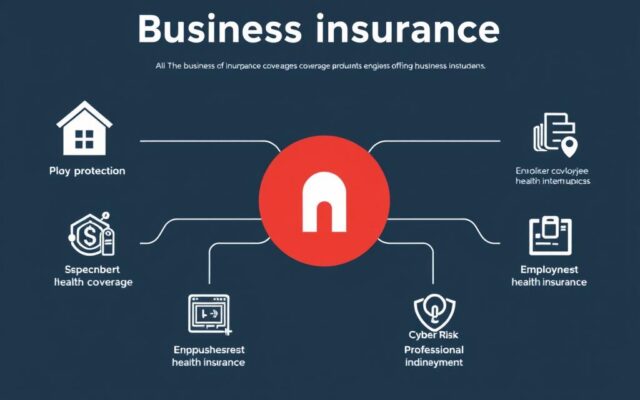Business insurance is useful, and business owners are able to comprehend technicalities involved in such transactions. However, it is imperative lawyers and protection providers alike do have an understanding of business insurance. That way, encouraging the protection required could foster business growth. Coverage of business insurance can range from one aspect such as property to several types. It even includes unique types of coverage. All these shows corporate insurance is an important risk management strategy that no business should ignore.
It is important to note that all firms need an insurance, irrespective of whether they provide services or manufacture products. This form of assurance is essential in safeguarding a company’s values and purpose, hence the importance. This will help you average out some of the common questions and phrases that may seem unfamiliar. It’s important to remember that the trilogy of concepts and contracts covered in this article form the backbone of any business of any size.
Business owners probably don’t have great relationships with their respective insurance brokers. However, insurance is an invaluable tool for guiding a business in reducing possible risks and threats. One of the goals of this article is to help business owners know or remember what the basic terms and conditions involve. This will begin with explaining typical business risks, and therefore, the importance of insurance packages.
Risk that arises from businesses include physical risk of loss or damage to property, lawsuits instigated against them by cyber sources, and physical destruction of systems used. The following area among others falls into an umbrella insurance coverage:
Asset loss – These are obligations sourced from assets destroyed or lost in an accident, through the forces of nature or through malicious activities that target the organization’s physical structures, equipment, or stock.
Third-party liability – This describes legal action that an entity can raise against another entity due to injury on a person who is not party in the transaction, or as a result of a product fault or a problem in advertisement.
Interruption of business activities: Such events will cause your business activities to be disrupted, for example power failures, disruption of suppliers, disasters or any emergency.
Cyber risk: Loss of data, cyber-attacks such as ransomware and other threats that may help an adversary obtain your confidential data or interfere with your systems.
Basic Coverage Components
Most insurance policies will have some of the following important parts:
Property insurance: This type of coverage will take care of your tangible assets such as the building, equipment and stocks.
Liability insurance: It provides coverage for third-party bodily injuries and claims due to defective products and advertising.
Professional liability: This is taken to protect against any any allegations of mistakes or negligence while carrying out professional services.
Workers’ compensation: This provides work related injury/illness and occupational disease benefits to employees.
Business interruption insurance: This insurance is taken to cover the loss of revenue and additional expenses suffered during business disruption.
Cyber liability insurance: This type of cover enables the insured to mitigate the financial impact arising from data breaches and cyber-attacks.
Insurance Requirements by Industry
The insurance requirements of a business are determined by the nature of the industry and the operations of that firm. For example, a construction company will require higher property coverage and liability coverage than professional services firms who will seek more professional liability insurance. It would be advisable to consult an insurance agent or company which is conversant with your business type.
| Industry | Key Insurance Coverages |
|---|---|
| Retail | General Liability, Property, Business Interruption |
| Healthcare | Professional Liability, General Liability, Workers’ Compensation |
| Manufacturing | Property, General Liability, Product Liability, Workers’ Compensation |
| Technology | Errors & Omissions, Cyber Liability, General Liability |
“Proper insurance coverage is not just a legal requirement; it’s a strategic investment in the long-term success and resilience of your business.”
Coverage for Business Owned Property
Every company is secure by making use of commercial property insurance. It offers protection for your physical possessions such as buildings, equipment, and inventories. Furthermore, it also includes security against fire, theft, natural disasters, and other such mishaps. With appropriate asset protection in place, one can maintain the ongoing functionality of the company while being protected against risks.
The process starts with establishing the insured amount which in our case is assets valuation. In estimating, it involves either determining the replacement cost or the current worth of the property. If the determination of the assets value is underestimated, then the financial losses will be rather huge. On the other extreme, if they are overvalued then the premiums payable will rise.
| Coverage Type | Typical Inclusions | Average Annual Premium |
|---|---|---|
| Building Coverage | – Physical structure of the building – Permanent fixtures and equipment |
$1,000 – $5,000 |
| Business Personal Property | – Furniture, fixtures, and equipment – Inventory and supplies |
$500 – $3,000 |
| Business Interruption | – Lost income and operating expenses – Extra expenses to maintain operations |
$1,000 – $5,000 |
Choosing the right commercial property insurance policy is crucial. Think about the risks and coverage your business needs. Some might need extra protection for expensive equipment or inventory. Others might focus on natural disasters or vandalism. Working with an experienced insurance provider helps ensure your business property coverage is right for you.
Let’s Take a Look at General Liability Coverage
With any operations in the virtual business world, it is essential that provisions are made for the possible legal liabilities. General liability coverage is a significant component of the business insurance. Most of the perils including third-party claims and products liability of the companies are covered with this.
Injury Coverage of Third Parties: The third-party liability insurance coverage is solely designed to protect the insured from hires. These are customers and visitors who may get injured within the business premise or as a result of the companies theirs. It steps in to take care of medical bills, attorney’s fees, settlements or awarded damages in court, thus salvaging the business from possible closure.
Attributes Of Product Liability: Firms that manufacture, distribute or retail products are prone to product liability. Such claims are compensated for through general liability insurance against defective products and inappropriate labels. This applies more to those who engage in manufacturing, retailing, and e-commerce.
Coverage For Injuries Caused by Advertisements
It is critical to note, that businesses ought to be cautious while advertising. In fact, general liability insurance also covers for advertising injuries committed. Such criticisms consist of: libel, slander, copyright infringement, and in some cases misappropriation of ideas. It safeguards the company against damage to her reputation and loss of finances.
Knowing the broad scope of general liability insurance enables business owners to safeguard their work. It ensures that the entrepreneurs have the confidence to aim for continued expansion and success.
When dealing with clients providing professional services in the United States, we have to keep in mind one very key thing – people make mistakes, and mistakes can have very serious repercussions. This is the reason as to why errors and omissions insurance_ (E&O) or professional liability insurance is very useful. It gives you protection against claims due to negligence, mistakes or services rendered poorly.
This kind of insurance is essential for any service-based business, including accounting, legal services, and healthcare, etc. The mentioned categories involve a lot of intellect, sensitive information, complex activities or high stakes decision making. With professional liability cover, a professional knows that he or she is covered under malpractice and errors and omissions insurance.
Picture an accountant that has been accused of overlooking part of the financing, a lawyer being accredited for not meeting a deadline, and healthcare provider being accused of misdiagnosis. Coverage of this kind may be beneficial for legal expenses, settlements or judgments. Such insurance enables the person to operate without the worry of lawsuits being a barrier.
With that being said, “professional liability insurance is a business insurance coverage which every business practicing any form of expert service or giving advice needs to have. It would be the best possible means of securing your business from destruction and your name from being ruined”.
The need to maintain professional liability insurance of some sort continues to be on the rise with the evolution of business. With this cover, professionals are able to shield their profession and clientele while remaining relevant in the market.
Requirements for Coverage for Workers’ Compensation
Workers’ compensation insurance is very critical for firms in America. It provides benefits to employees and covers injuries and illness as a result of work performed. Understanding the regulations as well as the caps of workers’ compensation is mandatory as it is required for adherence to the law and safety as well.
Benefits of Protection of Employees
- Workers’ compensation contains a number of benefits for the injured employees, which include:
- Repayment of medical expenses incurred as a result of injury or ill-health arising from functions performed at the workplace
- Partier on of income lost while recuperating and being out of practice
- Adjustments to income for those permanently or long-term entirely unable to work
- Payment to relatives of employees that die as a result of work-related duties
Legal Compliance Assessed Standards
In the majority of states, it is mandatory that firms have workers’ compensation insurance. The policies are not uniform across the states. There must be this insurance coverage from the time an employee is hired even if there is only one employee. Ignorance of these rules can result into huge fines as well as sanctions.
Restricting the Coverage: There exists a great degree of coverage in worker’s compensation, but it does have its limits. It only includes any injury or illness sustained in the course of one’s employment. Other types of accidents or health issues are not covered. In addition, even though the benefits compensate for many forms of losses, there is a limitation that could deny some claims for those who have suffered significant or prolonged injuries.
Business owners need to know how to deal with workers’ compensation insurance with a calm head. This coverage is important for employees and helps prevent legal and financial problems. Having an awareness of the advantages, methodologies, regulation, and boundaries, businesses can effectively implement safety measures at the workplace.
Business Interruption Insurance Protection
In the realm of business, there are uncertainties, and catastrophic events can come about at any time and cause a disruption to the activities of a business and also its financial standing. This is where business interruption coverage comes into play, allowing businesses to maintain their operations when all hope seems lost. It protects the earnings of a business and aids in the recovery efforts for lost sales while allowing the business to continue operations.
However, if such an event occurs like a hurricane, fire, or even if a business is affected by a pandemic due to a viral outbreak, business interruption insurance should be used. Insurance for this type of coverage reimburses for lost earnings and covers fixed costs that cause a burden on businesses, such as utilities and payroll. With this coverage, a business is able to ride out the storm and stay on the lookout for means to recover from the disaster without the risk of loss revenue.
Here are the advantages of business interruption coverage in a nutshell:
- Recovery of income that would have been earned during the close-down
- Provision for the continued expenses incurred in the course of business, like payments for rent and electricity
- Help to return the business into normal operating condition after the interruption
- Avoidance of the adverse effect of such events on the business in the long run
Welcome Innovention Insurance Group as the savior. With this kind of coverage, companies protect themselves against the worst-case scenarios. They know that regardless of what happens, they will always have support. This enhances their strength fused with preservation and growth.
| Key Benefits of Business Interruption Insurance | Description |
|---|---|
| Lost Income Replacement | Covers the loss of revenue during the period of business interruption |
| Ongoing Expense Coverage | Pays for continued operational costs, such as rent and utilities, during the closure |
| Disaster Recovery Assistance | Helps businesses resume normal operations after the disruptive event |
| Long-Term Financial Protection | Safeguards against the long-lasting financial impact of unexpected incidents |
By understanding the benefits of business interruption coverage, companies can make informed decisions. They can safeguard their financial future and ensure their resilience in the face of unforeseen challenges.
Cyber Liability: Extent and Scope of Data Breach Coverage Reassurance.
In the race to expand their businesses, most of the companies neglect the risk posed by data and hunger. Owing to the rising demand where organizations want to secure their digital assets, Cyber liability insurance is important. It helps minimize the financial and reputation impacts incurred due to these events.
Digital Asset Protection: Cyber liability insurance provides cover for the loss and theft of sensitive and personal digital information. This can be customer’s data, intellectual property, and financial information. It assists organizations manage the expenses of a data breach for example investigation and credit monitoring for the persons whom the breach impacted.
Response Plan Coverage: Apart from that, high quality cyber liability insurance is also aimed at temptation of response plans. It takes care of hiring cybersecurity consultants and restoration of systems after an attack. That way, they smoothen their operations and safeguard their clients’ loyalty.
| Key Benefits of Cyber Liability Insurance | Description |
|---|---|
| Cyber insurance | Protects against the financial consequences of data breaches and cyber attacks |
| Data breach protection | Covers the costs of investigating, notifying, and providing credit monitoring for affected individuals |
| Digital security coverage | Includes provisions for incident response planning and implementation to minimize disruption |
With the growing influx of businesses operating online, it is crucial to have a cyber liability insurance policy in place. It provides the protection of the digital assets and goes an extra mile to provide full response coverage. It assists in the fight against data breaches which are increasingly becoming an issue and enhances a company’s digital security framework.

How much auto insurance do you need for a business car?
Commercial automobiles must also be insured for work purposes. There are risks of injury, damage, or accident that occur to people or property. Even if you have only one car, this insurance is very important to everyone in business.
There are specific commercial automobile protection policies that are not offered in personal insurance. Some include liability coverage for damage to other people’s properties or damage to your car. The requirements and conditions of this insurance differ with respect to the industry and the type of automobile. However, its specific purpose is the hiding of vehicle-related expenses out of a business.
Obtaining business vehicle insurance, commercial automobile insurance, and fleet insurance should be encouraged. This will ensure that one runs their business without the hassle of unwanted expenses. The proper insurance enables business expansion since one does not have to worry about ‘vehicle related’ issues.
FAQ
What is included in business insurance?
For many risks, companies are protected by business insurance policies. Damage on the property, being a victim of liability claims, or making professional errors and injuries in the workplace are some of these. It covers fundamental aspects such as commercial property, general liability, as well as workers’ compensation.
What types of business risks can we consider to be transferred by insurance?
Business risks which can be insured include risks such as loss of property, risk of theft, loss through natural calamities etc. Other risks include liability to claims, mistakes of profession, injuries to employees among others. The insurance cover can be customized to the particular type of business.
How do the basic coverage components of a business insurance policy operate?
Policies of business insurance have distinct parts. These consist of cover of property, cover of liabilities and cover of employees’ injury. Each part can be varied according to the measurement of the business and its requirements.
How insurance issues vary from one industry to the other?
The requirement for the insurance differs from industry to industry. Contractors for instance are likely to require higher limits on liability while professional service providers are better off with error and omission insurance. Awareness of the risks of one’s industry is vital in obtaining the correct policies.
How can commercial property insurance give protection against business losses?
Commercial property insurance makes provision for tangible property, building and equipment owned by the businesses. It also covers risks of loss through theft, fire and natural calamities. This ensures business sustains itself after incurring losses through buying stock for resale.
What insurance cover by means of general liability insurance successfully protect against?
General liability insurance covers all claims in form of wounds or injuries or damage to properties. Its also able to deal legal costs as well. This involves customers who incur injuries as well as any claims that arise from products and advertisement.
What are the benefits of professional liability insurance aka errors and omissions for businesses?
As the term suggests, professional liability insurance is an insurance that relieves clients from negligence and mistakes made. Most systems of businessessuch as consulting and IT, consider this to be critical. This coverage is aimed at cost-effective means to secure clients from losses due to professional blunders.
What are the components of the workers’ compensation coverage in detail?
This type of insurance is provided where an employee has been injured or has fallen sick due to the occupation. It provides for indoor expenses, income which is average and lost overtime pay amongst others, as well as pays for any disability. In addition, employers are legally shielded. This is a requirement for nearly all firms as it is a means to cover for their staff.
What is the purpose of business interruption insurance? How does this help companies?
Any income which is being worked on for the time being as well as lost income which could have been earned during the time of the closure is covered under the umbrella business interruption insurance coverage policy. This includes interruptions which are caused by natural disasters and fires. It helps businesses stay afloat and recover their earnings in no time.
What is the nature of coverage provided under cyber security insurance?
This includes all types of insurance which protect from data breaches as well as cyber-attacks. This also includes the cost which is involved in breach response or recovery and insurance of digital properties as well. This is critical for companies since branding is majorly done online.
What is the documentation needed for a commercial auto’s insurance?
This is an insurance cover which is for businesses which have vehicles which are needed when running the business. Delivery is among those activities as well as transporting employees. It provides for accidents as well as property damage and thus ensures regulation is not violated.







